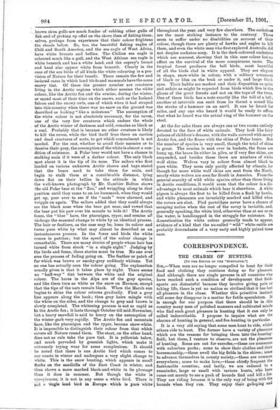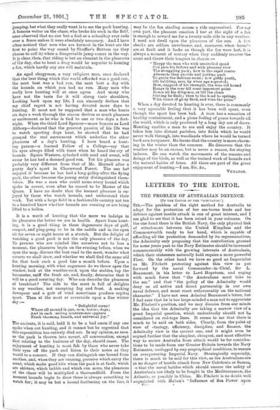CORRESPONDENCE.
THE CHARMS OF HUNTING.
(TO THY EDITOR OF TUE "8PECTATOR:1
Sin,—When men are no longer compelled to hunt for their food and clothing they continue doing so for pleasure. And although there are single persons in all countries who have reached such a condition of development that field. sports are distasteful because they involve giving pain or taking life, there is yet no nation so civilised that it has lost all pleasure in the chase. Whether this primitive instinct will some day disappear is a matter for futile speculation. It is enough for our purpose that there should be in this country many men of polished manners and cultivated minds who find such great. pleasure in hunting that it can only be called indescribable. I propose to inquire what are the charms of hunting in general, and fox-hunting in particular.
It is a very old saying that some men hunt to ride, whilst others ride to hunt. The former have a variety of pleasures which are the reasons for bringing them into the hantiag- field; but these, I venture to observe, are not the pleasiues of hunting. Some are out for exerelee,—these are numerous with suburban packs ; some to show their clothes and their horsemanshipa—these swell the big fields in the shires; -some to advance, themselves in county, society,—these are common everywhere ; some to make love,—these chiefly frequent the fashionable counties; and lastly, we are reduced to a remainder, large or small with various hunts; who have come out merely to ice a. pack of hounds find arid kill a fax. They are riding because it is the only way, of being with the hounds when they rim. They enjoY their gallO148 The ancients, it is said held it to be a had omen if any one spoke when out bunting, and it cannot but be regretted that this superstition has entirely died out. In my opinion, as soon as the pack is thrown into covert, all conversation, except that relating to the business of the day, should cease. The enjoyment of hunting is most felt by those who never take their eyes off the pack and listen to their notes as they would to a concert. If they can distinguish one- hound from another, and, when they are running, perceive which 'carry the scent; which make good hits when the pack is at fault, which are skirtere, which babble and which rail mute, the pleasures of the chase- will be multiplied a thousandfold. From the moment hounds begin to draw there is always something to viatch for; it may be but a hound feathering on the liner it jumping, but what they really want is to see the pack hunting. A:faiiious writer on' the chase, who broke•his-neck in the field, once observed that no one -but a fool or a-schoolboy ever rode over a fence-unless it were absolutely necessary. And I have often-noticed that men Who are keenest in the hunt are the first to -point the way round by Shuffier's Bottom (es they Chaise to call-it) ivhena disagreeable jump comes in the way.- . It is clear, then, that riding is but an element in the pleasures- of tlie•day, else to hunt a drag-would • be Superior to hunting a fox, which hardly any one will maintain.
-An aged clergyman, a very religious man, .once .declared that the -best thing which this world afforded was a good run,; the-next best was .4 bad run, the next best a day with the hounds. on which. you had no run.. Many men who. really love hunting will at onee.. agree. And many who have not the taste for it will shrug their shoulders, Looking -back upon my. life, I can sincerely declare that my chief regret is not having devoted more days to hunting.. It must not be supposed. that a man who hunts six days. a week through the season derives as much pleasure or excitement as he 'who is tied to one or two days a fort- night. When the third Lord Spencer—more famous as Lord 'Althorp—declared that the greatest passion of his life was to watch sporting dogs hunt, be showed that he had grasped - the real amusement which underlies the other pleasures of a day's hunting. I have heard a hunt- ing parson—a learned Fellow- of a College—say • that his eyes always filled with tears when be heard the cry of hounds. Squire Western, splashed with mud and sweat, will swear he has had a damned good run, Yet his pleasure was probably very different from that of Mr. Meynell after a pretty day's sport in Charnwood Forest. The one has enjoyed it because he has had a long gallop after the flying pack, the other because the young entry distinguished them- selves. He was a man who could name every. hound which spoke in covert, even after he ceased to be Master of the Quorn. I have' no doubt that the keenest pleasure is en- joyed by those who watch hounds, and understand their work. Yet with a large field in a fashionable country not ten in a hundred know whether hounds . are running or are being lifted to a holloa.
It is a merit of hunting that the more we indulge in its pleasures the better we are in health. Apart from hunt- ing, it ie a good • thing in these degenerate days of. golf, croquet, and ping-pong to be in the saddle and in the open air for seven or eight hours at a stretch. But the delight of watching a good pack is not the only pleasure of the day. To persons who are minded like ourselves not to lose a moment, the pleasures begin on the evening before, when we open the map, discuss the best road to the meet, wonder what coverts we shall draw, and whether we shall find the same old fox that took such a good line a month before. Upon a hinting morning, with what eagerness do we throw open the window, look at the weather-cock upon the stables, tap the barometer, sniff the fresh air, and, finally, determine that it will be a good scenting day. Who can describe the pleasures of breakfast? The ride to the meet is full of delights in any weather, not excepting fog and frost. A soaking downpour and a gale of wind sometimes produce capital sport. Then at the meet or covertside upon a fine winter day:—
" Delightful scene! Where all around is gay, men, horse-, dogs; And in each miling countenance appears ' Fresh blooming health, and universal joy." may be the fox stealing across a ride unperceived. For my own part, the pleasant emotion neel at the sight of a fox
is enough to- reward me for a twenty-mile ride in any weather.
I need not dwell upon the pleasures of the. run. A Icy checks are seldom unwelcome, and, moreover, when' houmli
are at fault and it looks as though the fox were . lost, it is always a moment of ecstasy when they suddenly recover the scent and throw their tongues in chorus :—
"Happy the man who with unrivalled speed Can pass his fellows and with pleasure view The sttuggling pack ; how in the rapid course Alternate they preside and jostling push To guide the dubious scent; how giddy youth, - Oft babbling, errs, by wiser age reproved; ' How,-niggard of his strength, the wise old hound Hangs in the rear till some important point Rouse all his diligence, or till the chase f. ink lug he finds; then to the head he springs, With thirst of glory fired, and wins the prize."
When a day devoted to hunting is over, there is commcinly a very agreeable feeling that it has been well spent, even though the sport has been bad. A man has a sensation of healthy contentment, and a pious feeling of peace towards' all the world, which is only produced by a long day out of doors. Hunting enables a man to see and enjoy the country. It takes him into distant parishes, into fields. which he would never walk through, into woodlands where he would be turned
back as a trespasser. He learns that the country is more charm- ing in the winter 'than the summer. He discovers that the weather may be an excuse, but is never a reason, for staying indoors. He can watch the movements of the seasons and doings of the birds, as well as the trained work of hounds and the natural habits of foxes. All these are part of the great enjoyment of hunting.—I am, Sir, &c.,
VEN.A.TOA.











































 Previous page
Previous page